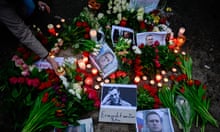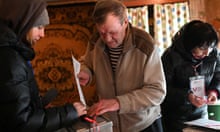Just days after the death of opposition leader Alexei Navalny in a prison colony, human rights activists and journalists are warning that dozens of other political prisoners may be at risk of death from deliberate abuse of ill convicts in the Russian prison system.
Dmitry Muratov, the Nobel-prize winning editor of Novaya Gazeta, told the Observer that Navalny’s death had sent a clarion call for the world to save the Russian political prisoners who could die next.
“I already can’t help Navalny,” said Muratov. “But there are several people there in the worst condition right now … I’ll tell you straight: we have several more deaths coming.”
Yesterday it was reported that Navalny’s body has been handed over to his mother. His spokeswoman Kira Yarmysh wrote on the social media platform X that she did not know if the authorities would allow a funeral to be held “the way the family wants and the way Alexei deserves”.
Among those in mortal danger, Muratov listed Vladimir Kara-Murza, a prominent Kremlin critic serving 25 years for lobbying western governments to sanction Putin’s top aides and allies; Igor Baryshnikov, convicted of publishing “fake information about the Russian military” and suffering from prostate cancer; and Alexei Gorinov, who was sentenced to seven years for “knowingly spreading false information about the Russian army”. He suffers from chronic lung disease and had a third of his lung amputated in 2016, Muratov said. Now in prison “he’s suffocating. He’s turning blue”.
Gorinov was one of the first Russians sentenced under the tough laws that Vladimir Putin pushed through in 2022 to dissuade criticism of the war. He was charged after speaking out against proposals to hold a children’s drawing contest and a dancing festival despite the war in Ukraine, where Gorinov said that children were dying.
Friends and relatives believe that political prisoners are targeted for poor treatment. “I believe Alexei is being killed in prison,” Darya Volya, a close friend of Gorinov’s, told the Observer. “Deliberately killed because the severity of his condition and his age are well known. The conditions in which he is being held and the refusal to give him prompt proper treatment is a very painful murder of a human being in slow motion.”

Volya said Gorinov was already in poor health before his arrest, due to severe consequences from Covid-19. In prison, she said, his condition has worsened.
“In January, he wrote that he was in hospital and that his body never experienced such challenges in his whole life,” said Volya. “Of course, he does not receive proper treatment and the place where he is kept is unliveable: it is insanely cold and damp, and there are always more people there than the cell can hold.”
In a public appeal, Novaya Gazeta listed 13 political prisoners held “whose health and lives can be saved if we can force the state to unclench its jaws”. Muratov said he had unsuccessfully lobbied the International Red Cross last year to demand access to Navalny in prison and consequently called on other countries to seek exchanges for Russian political prisoners “or else we can expect more deaths”.
“These are just the people who have spoken publicly about the fact that they’re ill,” said Vera Chelishcheva, the head of Novaya Gazeta’s legal reporting team. “There are thousands more who are ill whom we just don’t know.”
Those jailed in political cases are often “intentionally” mistreated or neglected, she said. “We were too late with Alexei. But there’s still a chance to visit these people and save their lives.”
Ilya Yashin, an ally of Navalny’s serving eight years for writing about Russian war crimes in Bucha, has said he fears that “my life is in Putin’s hands”. He called for foreign governments to secure the release of Kara-Murza, who he said was ill and that the “threat to his life is not just real, it is off the charts”.
Kara-Murza has complained of numbness in his extremities and other health issues, an apparent complication from being poisoned several times. “The prison system is completely merciless to both of them,” said Yashin. “Alexei and Vladimir did not get out of the punishment cells, they were subjected to torture conditions. Both were experiencing serious health problems.”
Allies of the jailed activists have urged western governments to exchange prisoners, including spies, to secure the release of Kremlin critics such as Kara-Murza.
after newsletter promotion
In its relentless crackdown on all anti-war dissent, the Russian government has not only imprisoned veteran politicians such as Yashin and Kara-Murza, but has also gone after artists and creatives such as Sasha Skochilenko.

Last November, the authorities sentenced Skochilenko, a feminist artist and musician from St Petersburg, to seven years in a colony for replacing five supermarket price tags with anti-war messages. Skochilenko’s trial became one of the most prominent examples of the government’s crackdown on all forms of dissent since the start of the war. She is suffering from coeliac disease and a chronic heart condition.
“Sasha is not getting the right medical attention,” said her partner, Sonya Subbotina.Subbotina said she was worried Skochilenko’s chronic health conditions meant there was a risk of her dying in prison.
“Sasha’s prison conditions will only get worse once she is transferred to a prison colony,” said Subbotina. Skochilenko, 33, was “fragile” and dealing with depression as well as PTSD which was triggered by her arrest, added Subbotina.
“Sasha was detained by 5 men who violently threw her into a police. She had hematomas on her body. They also humiliated her during the searches of her flat and even threatened to rape her. She doesn’t sleep well and has constant nightmares,” Subbotina said.
Yet Skochilenko remains defiant. “What will you tell your children? That one day you jailed a seriously ill artist for five pieces of paper?” she told prosecutors in a powerful final statement from court.
“I’m not afraid, and maybe that’s precisely why my government is so afraid of me, and keeps me in a cage like the most dangerous of animals.”










